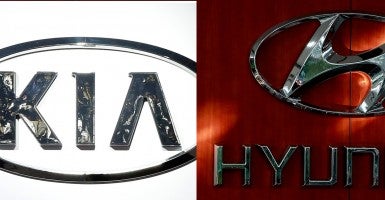The federal government just fined Kia and Hyundai motors $100 million dollars. Was the culprit:
A.) Sudden acceleration of vehicles.
B.) Excess dirty pollutants spewing out of exhaust pipes.
C.) Too much of a colorless, odorless nontoxic gas that will at best make an infinitesimal impact on climate change.
If you said C, sadly you’d be right. You’d also be wise to ask yourself what in the world our bureaucrats are doing.
The Environmental Protection Agency is fining Kia and Hyundai for underreporting greenhouse gas emissions for more than one million of their vehicles. In what the EPA is calling a “historic greenhouse gas enforcement case,” the EPA is fining Kia and Hyundai largely for the 4.75 million metric tons of GHGs that the companies failed to certify to the EPA. The automakers also over-reported the fuel efficiency of several vehicles and settled through a series of lawsuits creating a compensation program for buyers for misstating the mileage on cars.
The underpinning behind the fine is that the EPA is regulating carbon dioxide and other greenhouse gas emissions. But the EPA isn’t regulating them because of any direct adverse health impacts to humans or the environment. Washington is regulating greenhouse gas emissions because of their alleged effect on warming. While the bulk of the EPA’s climate plan is cutting carbon dioxide from new and existing power plants, the first victim of the agency’s climate warpath was restrictions on greenhouse gas emissions from tailpipes issued through more stringent fuel economy standards.
The Washington Post writes:
The record fine of $100 million and other penalties were described as the largest enforcement action of its kind under the federal Clean Air Act, in an unusual case involving emissions credits earned by manufacturers for producing low-emission vehicles, Environmental Protection Agency and Justice Department officials said in announcing the agreement. Under the terms of a voluntary consent decree, Hyundai and Kia also will forfeit 4.75 million greenhouse-gas credits, estimated to be worth more than $200 million. Car companies earn the credits for manufacturing vehicles that emit less greenhouse-gas pollution than the law requires.
Attorney General Eric Holder remarked, “This settlement upholds the integrity of the nation’s fuel economy and greenhouse-gas programs and supports all Americans who want to save fuel costs and reduce their environmental impact.”
Holder’s comments are problematic for a number of reasons. These burdensome regulations imposed by federal bureaucrats are not about fuel economy or environmental improvement. The EPA’s regulation of greenhouse gas emissions and fuel efficiency standards are about micromanaging the economy.
But Americans don’t need the federal government to tell them how to save money on fuel costs–they’re perfectly capable of making those decisions on their own. Car manufacturers can meet the demands of the consumers without help from the federal government. And while mile-per-gallon standards for motor vehicles date back to the 1970s, they weren’t a good idea then and they’re not now. They override choice from the individual and place those choices in the hands of Washington regulators.
Importantly, Kia and Hyundai’s violation was not some major environmental gaffe, either. The carbon emissions coming from motor vehicles, power plants, industrial sources and humans exhaling aren’t polluting our breathable air. As mentioned above, this is a nontoxic gas we’re talking about here. The regulations are all about a warming planet but evidence continues to show that climate change is not the calamity proponents of the regulations make it out to be. And the regulations promulgated by the federal government aren’t going to make a dent in global emissions and therefore have no measureable impact on the earth’s temperatures.
However, placing limits are carbon-emitting conventional fuels, which provide a large majority of Americans’ energy needs, will have an adverse measurable impact on the pocketbooks of American families and the broad economy, not to mention on a few auto manufacturers. We rely on energy for just about most goods and services and when the federal government drives up costs with regulations, families and businesses are hit again and again.
Whatever the make up the new Congress may be, it’s clear that the EPA’s climate regulations need to go.































One Reply to “The Crazy Reason Two Auto Companies Were Fined $100 Million”